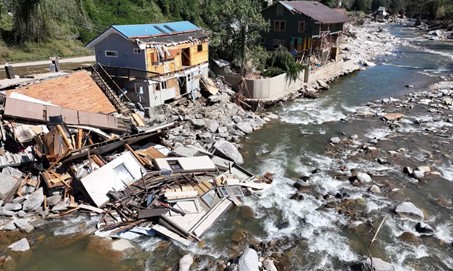
Global Warming Doubles Likelihood of Hurricanes Similar to Helene, Data Reveals
Analysis Shows Gulf Heat that Worsened Hurricane Helene 200-500 Times More Likely Due to Human-Caused Global Warming
As Hurricane Milton approaches Florida, driven by unprecedented warmth in the Gulf of Mexico, a new analysis reveals that the heat contributing to last month's Hurricane Helene was 200 to 500 times more likely due to human-induced global warming.
Hurricane Helene, one of the deadliest storms in U.S. history, intensified over the Gulf before making landfall with wind speeds reaching 140 mph (225 km/h). The analysis indicates that climate change increased the hurricane's rainfall by 10%, resulting in over 220 fatalities across six states as it moved northward, causing widespread destruction to towns, infrastructure, and water supplies. It also intensified Helene's winds by about 13 mph, or 11%.
According to a multinational team of scientists from the World Weather Attribution group, the combustion of fossil fuels has made storms as severe as Helene approximately 2.5 times more likely than in the pre-industrial era. The study warns that if global temperatures rise by 2°C above pre-industrial levels—which is likely without significant reductions in emissions—storms like Helene could see a further 10% increase in rainfall.
"The heat that human activities are adding to the atmosphere and oceans is like steroids for hurricanes," said Bernadette Woods Placky, chief meteorologist at Climate Central and part of the attribution group. She added that storms like Helene and Milton are becoming increasingly "explosive" due to excess heat.
A Climate Central study released on Monday noted that the sea surface temperature along Milton's path is 400-800 times more likely due to the climate crisis. "If humans keep heating the climate, we will keep seeing storms rapidly morph into monster hurricanes, leading to more destruction," Placky stated.
This analysis of Helene comes as Hurricane Milton, which also strengthened over the Gulf, has surprised scientists by escalating from a Category 1 storm to a Category 5 in just nine hours, reaching maximum winds of 180 mph. The storm is expected to make landfall in the Tampa area late Wednesday, with the city's mayor issuing urgent evacuation warnings.
Both hurricanes intensified rapidly over the Gulf, with researchers attributing their strength to exceptionally warm seawater. This summer, the Gulf's surface and deeper waters have experienced record-high temperatures, with Milton set to pass over an area near Tampa that is approximately 2-3°C hotter than normal.
Hurricanes gain strength from warmer oceans and atmospheres, which not only accelerate the storms but also increase their moisture content, leading to devastating rainfall. This phenomenon was evident when Helene caused catastrophic flooding that affected communities far inland, including western North Carolina.
"The Gulf is still at an anomalously high temperature, and when you have these warm conditions, you are more likely to see rapidly intensifying hurricanes," said Brian McNoldy, a climate scientist at the University of Miami. Other factors, such as wind shear, also influence storm formation, but the persistent heat in the Gulf has raised alarms about the potential for more events like Helene and Milton.
"We were anxiously waiting to see if a hurricane would exploit all this heat," McNoldy remarked. "It's like there was a powder keg waiting for a spark. Now we have that spark. Milton is a remarkable storm; its rate of intensification is exceptional in recorded history."
Scientists have observed that a warmer atmosphere can hold about 7% more water vapor for each degree of warming. The world has warmed by at least 1.3°C since the pre-industrial era, and concerns are growing that this trend may be accelerating.
"What many people don't realize is that only 1% of this extra heat is going into the atmosphere. Our global temperature records only reflect 1% of the total increase in the Earth's heat content," stated Katharine Hayhoe, chief scientist at the Nature Conservancy and a professor at Texas Tech University. "Eighty-nine percent of this heat is absorbed by the oceans, contributing to rising sea levels, deadly marine heatwaves, and stronger, more rapidly intensifying hurricanes."
With the U.S. presidential election approaching, the twin hurricanes serve as a stark reminder of the impacts of a warming planet that permeate nearly every aspect of life. Donald Trump, who has previously dismissed climate change as a "hoax," was forced to cancel an appearance in Miami due to Milton's impact. In contrast, Kamala Harris has acknowledged the threats posed by global warming but has largely avoided the topic during campaign events.
"Climate change is in our face right now, and people are making that connection," said Kathie Dello, the state climatologist for North Carolina, which was severely affected by Helene. "There's a growing awareness that we are witnessing unprecedented events and are unprepared for the consequences of climate change.
"Climate isn't usually the number one issue in elections, but the economy suffers from hurricanes, schools are closed, and people lack food, shelter, and water. Climate is deeply intertwined with all of this."
According to the UN, the solution lies in halting fossil fuel consumption. "Our future is in our hands," Hayhoe concluded.